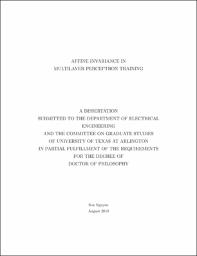
ATTENTION: The works hosted here are being migrated to a new repository that will consolidate resources, improve discoverability, and better show UTA's research impact on the global community. We will update authors as the migration progresses. Please see MavMatrix for more information.
Show simple item record
| dc.contributor.advisor | Manry, Michael T. | |
| dc.creator | Nguyen, Son Nam | |
| dc.date.accessioned | 2019-08-27T18:53:17Z | |
| dc.date.available | 2019-08-27T18:53:17Z | |
| dc.date.created | 2019-08 | |
| dc.date.issued | 2019-08-06 | |
| dc.date.submitted | August 2019 | |
| dc.identifier.uri | http://hdl.handle.net/10106/28604 | |
| dc.description.abstract | Training methods for both shallow and deep neural nets are dominated by first order algorithms related to back propagation and conjugate gradient. However, these methods lack affine invariance so performance is damaged by nonzero input means, dependent inputs, dependent hidden units and the use of only one learning factor. This dissertation reviews affine invariance and shows how MLP training can be made partially affine invariant when Newton's method is used to train small numbers of MLP parameters. Several novel methods are proposed for scalable partially affine invariant MLP training. The potential application of the algorithm to deep learning is discussed. Ten-fold testing errors for several datasets show that the proposed algorithm outperforms back propagation and conjugate gradient, and that it scales far better than Levenberg-Marquardt. | |
| dc.format.mimetype | application/pdf | |
| dc.language.iso | en_US | |
| dc.subject | Back propagation | |
| dc.subject | Vanishing gradient | |
| dc.subject | Balanced gradient | |
| dc.title | AFFINE INVARIANCE IN MULTILAYER PERCEPTRON TRAINING | |
| dc.type | Thesis | |
| dc.degree.department | Electrical Engineering | |
| dc.degree.name | Doctor of Philosophy in Electrical Engineering | |
| dc.date.updated | 2019-08-27T18:55:28Z | |
| thesis.degree.department | Electrical Engineering | |
| thesis.degree.grantor | The University of Texas at Arlington | |
| thesis.degree.level | Doctoral | |
| thesis.degree.name | Doctor of Philosophy in Electrical Engineering | |
| dc.type.material | text | |
| dc.creator.orcid | 0000-0001-9409-4738 | |
Files in this item
- Name:
- NGUYEN-DISSERTATION-2019.pdf
- Size:
- 1.049Mb
- Format:
- PDF
This item appears in the following Collection(s)
Show simple item record


